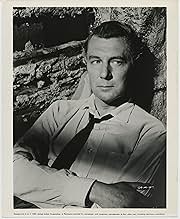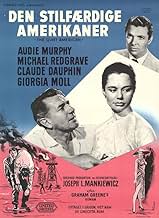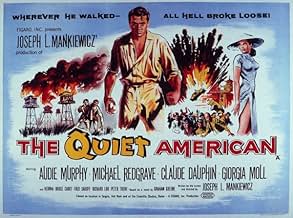IMDb RATING
6.7/10
2.3K
YOUR RATING
A young naive American and a cynical older British diplomat disagree over politics in 1952 Vietnam and over a beautiful young native girl.A young naive American and a cynical older British diplomat disagree over politics in 1952 Vietnam and over a beautiful young native girl.A young naive American and a cynical older British diplomat disagree over politics in 1952 Vietnam and over a beautiful young native girl.
- Director
- Writers
- Stars
- Awards
- 1 nomination total
Georges Bréhat
- French Colonel
- (as Georges Brehat)
Vo Doan Chau
- Cao-Dai Commandant
- (uncredited)
Le Van Le
- Cao-Dai Pope's Deputy
- (uncredited)
Cho Cha Lung
- Hotel Waiter
- (uncredited)
- Director
- Writers
- All cast & crew
- Production, box office & more at IMDbPro
Featured reviews
A love triangle played out in early 50s Saigon (prior to independence). A British reporter gets to know a younger American of seemingly innocent intent--the American wants the British reporter's mistress for a wife.
There were at least 2 versions of this book made into films this one (1958) and a later one with Michaeal Caine.
This movie has a plot twist not in the book that makes it in a way a bit more interesting but not nearly as realistic. Most viewers would probably disagree. I thought at first I had forgotten the story from the book.
Greene's best novels are about as good as they get....a lot of the lines in the movie are lifted from the book--which makes for a very good quality script.
Recommend...need to see the Caine version....to compare. Have my doubts about it being better as it was made in the modern PC era.
There were at least 2 versions of this book made into films this one (1958) and a later one with Michaeal Caine.
This movie has a plot twist not in the book that makes it in a way a bit more interesting but not nearly as realistic. Most viewers would probably disagree. I thought at first I had forgotten the story from the book.
Greene's best novels are about as good as they get....a lot of the lines in the movie are lifted from the book--which makes for a very good quality script.
Recommend...need to see the Caine version....to compare. Have my doubts about it being better as it was made in the modern PC era.
The Quiet American (1958)
I think this is an extraordinary film. At the time, Americans didn't like it because it made them look bad, and the writer of the book it is based on, Graham Greene, didn't like it because it changed too much of his anti-American plot. But as a film, whatever its blurring of truth to history, is true about human nature. The credit for this goes not only to Greene, the enormously gifted writer and co-screenwriter, but also to the director, one of the lesser known American masters at telling a romantic story, Joseph L. Mankiewicz, who also helped with the screenplay.
The two are a perfect match, really, because both are all about subtlety and observation. Greene in particular has a way of bringing up the biggest issues in the most intimate and delicate ways, never grandiose, always psychologically sharp. And that is carried forward here in Vietnam a decade before the American War of the 1960s. The Communists are already fighting in the north, the French are getting ready to abandon the country to the Americans, and a British reporter is the center of our attention, not quite on anyone's side.
There are two key characters, the reporter played with astonishing depth and acumen by Michael Redgrave, and "the American", played toward a caricature by Audie Murphy, with enough twists to his character to avoid over-stereotyping.
Greene's observations of American do-good naiveté are fascinating, and the way this gets mixed (poisoned) with American meddling and military subversion is way ahead of its time. Or is it? It might be simply observant of the facts in 1950s Vietnam. Greene was a reporter himself there then, and after this book was published he was followed by American Intelligence until his death in 1991. One of the brilliant aspects of this movie is how it is not simply a love story, but has a trenchant, disturbing comment to make about world affairs, from the inside.
Still, love intrudes, and the crossed loves of the two men for the same young Vietnamese woman is less clichéd than you might expect. The story is moving without being sentimental. And all of this is layered up with the actual Imperialist/Colonialist facts of the time. The conflicting sides of a war that few really understood (it seems) until twenty years later are here in their full formed germinations. Unlike the Michael Caine version of the same story (from 2002), this one was made before history had unfolded. It's endlessly almost chillingly fascinating, even though Greene's anti-war (and somewhat anti-American) tone was largely removed. The later movie might be closer to the book, but it feels like a movie made about history, not one that predicts it.
There are some scenes here, priceless ones, shot in Vietnam in 1958, the rest is done (with terrific light and set design) in an Italian film studio. Greene was British and the production Italian, but Mankiewicz was American, and fully steeped in American filmmaking and myth making. It's this last aspect that is key--the movie is made to the highest standards of 1940s American melodramas, even having an echo (in terms of light and drama and style) of William Wyler's "The Letter" also set in Southeast Asia. The filming is astonishing--the photography is in the hands of Robert Krasker, who shot "The Third Man" and "Brief Encounter" to give you an idea of the moody richness of his style.
And as a melodrama it comes down to the crumbling personal world of Fowler. At the end, in the busy night streets of a chaotic Saigon, he says, "I wish there was someone to whom I could say I'm sorry." I found it the final moving, beautiful strain of truth and pathos in a very special movie.
I think this is an extraordinary film. At the time, Americans didn't like it because it made them look bad, and the writer of the book it is based on, Graham Greene, didn't like it because it changed too much of his anti-American plot. But as a film, whatever its blurring of truth to history, is true about human nature. The credit for this goes not only to Greene, the enormously gifted writer and co-screenwriter, but also to the director, one of the lesser known American masters at telling a romantic story, Joseph L. Mankiewicz, who also helped with the screenplay.
The two are a perfect match, really, because both are all about subtlety and observation. Greene in particular has a way of bringing up the biggest issues in the most intimate and delicate ways, never grandiose, always psychologically sharp. And that is carried forward here in Vietnam a decade before the American War of the 1960s. The Communists are already fighting in the north, the French are getting ready to abandon the country to the Americans, and a British reporter is the center of our attention, not quite on anyone's side.
There are two key characters, the reporter played with astonishing depth and acumen by Michael Redgrave, and "the American", played toward a caricature by Audie Murphy, with enough twists to his character to avoid over-stereotyping.
Greene's observations of American do-good naiveté are fascinating, and the way this gets mixed (poisoned) with American meddling and military subversion is way ahead of its time. Or is it? It might be simply observant of the facts in 1950s Vietnam. Greene was a reporter himself there then, and after this book was published he was followed by American Intelligence until his death in 1991. One of the brilliant aspects of this movie is how it is not simply a love story, but has a trenchant, disturbing comment to make about world affairs, from the inside.
Still, love intrudes, and the crossed loves of the two men for the same young Vietnamese woman is less clichéd than you might expect. The story is moving without being sentimental. And all of this is layered up with the actual Imperialist/Colonialist facts of the time. The conflicting sides of a war that few really understood (it seems) until twenty years later are here in their full formed germinations. Unlike the Michael Caine version of the same story (from 2002), this one was made before history had unfolded. It's endlessly almost chillingly fascinating, even though Greene's anti-war (and somewhat anti-American) tone was largely removed. The later movie might be closer to the book, but it feels like a movie made about history, not one that predicts it.
There are some scenes here, priceless ones, shot in Vietnam in 1958, the rest is done (with terrific light and set design) in an Italian film studio. Greene was British and the production Italian, but Mankiewicz was American, and fully steeped in American filmmaking and myth making. It's this last aspect that is key--the movie is made to the highest standards of 1940s American melodramas, even having an echo (in terms of light and drama and style) of William Wyler's "The Letter" also set in Southeast Asia. The filming is astonishing--the photography is in the hands of Robert Krasker, who shot "The Third Man" and "Brief Encounter" to give you an idea of the moody richness of his style.
And as a melodrama it comes down to the crumbling personal world of Fowler. At the end, in the busy night streets of a chaotic Saigon, he says, "I wish there was someone to whom I could say I'm sorry." I found it the final moving, beautiful strain of truth and pathos in a very special movie.
I loved the Graham Greene novel. I admit I picked it up secretly from my father's library when I was 15. It stayed with me. I knew about the existence of this 1958 version written and directed by Joseph L Mankiewicz but I had never seen it until now, thank you TCM. I had seen the 2002 with a terrific Michael Caine but the film - a more faithful version of Greene's novel according to the critics and it may be true but the 2002 version left me pleased but unmoved while the 1958 version is much more unsettling, in spite of some hard to understand choices by the filmmakers. Audie Murphy plays the quiet American, and he is, very quiet. Good looking a real life American war hero but he is not an actor and here he is sharing the frame with Michael Redgrave. Michael Redgrave! The other oddity is the casting of Italian Actress Giorgia Moll as the Vietnamese girl-in-the-middle. She's lovely but I repeat, she's Italian. No, the power force here is Michael Redgrave, A marvelous, fearless performance and that alone makes The Quiet American an absolute must.
The next thing to do after seeing The Quiet American is to see the version done 44 years later. The novel by Graham Greene is set in French Indo-China in 1952 and this version is prophetic. The other one surely has the advantage of a whole lot of hindsight. This film done in 1958 has a lot of foresight.
I don't know what to make of Audie Murphy's character, it's never brought out, but he seems to be a CIA man. In the novel he's from the Ivy League, but due to Murphy's speech pattern, his character is from Texas. He's bringing in plastic for industrial purposes purportedly, but we see how the 'plastic' is really used.
The political picture of Indo-China in 1952 has the United States already seeing the French won't hold on and they're getting ready to put in their own surrogate in when the French do fall. Murphy is forever talking about a 'third force' who will bring western style democracy.
Murphy also becomes romantically involved with Giorgia Moll who is also the mistress of British newspaper correspondent Michael Redgrave. The rivalry between the two prevents either from acting coherently though Redgrave has a much better idea of what's really happening.
Interestingly enough the United Kingdom was also fighting to hold on in Malaya the same way that the French were trying to hold on to Indo-China next door. The British were far more successful though.
The Quiet American should have been seen by policy makers in Washington through six administrations in America. A lot of valuable lessons could have been learned and a lot of valuable lives might never have been lost.
I don't know what to make of Audie Murphy's character, it's never brought out, but he seems to be a CIA man. In the novel he's from the Ivy League, but due to Murphy's speech pattern, his character is from Texas. He's bringing in plastic for industrial purposes purportedly, but we see how the 'plastic' is really used.
The political picture of Indo-China in 1952 has the United States already seeing the French won't hold on and they're getting ready to put in their own surrogate in when the French do fall. Murphy is forever talking about a 'third force' who will bring western style democracy.
Murphy also becomes romantically involved with Giorgia Moll who is also the mistress of British newspaper correspondent Michael Redgrave. The rivalry between the two prevents either from acting coherently though Redgrave has a much better idea of what's really happening.
Interestingly enough the United Kingdom was also fighting to hold on in Malaya the same way that the French were trying to hold on to Indo-China next door. The British were far more successful though.
The Quiet American should have been seen by policy makers in Washington through six administrations in America. A lot of valuable lessons could have been learned and a lot of valuable lives might never have been lost.
10yostwl
Graham Greene did not have a comfortable vision of the world--or at least of the activities of human beings in the world. While very few movies do justice to books on which they are based, the Quiet American is a chilling forewarning of what the United States would be letting itself in for in the years to come. Murphy, always an appealing figure on the screen but not noted for truly great acting depth and breadth, is ideal for this understated role. A very well done thriller which addresses racism, colonialism, various "economic"isms, all the while focusing on the individual human impacts of high level decision-making. Are we just pawns, forced into just following orders, or do we have the responsibility to take action on the side of what we know to be right, in spite of the personal cost?
Did you know
- TriviaThe first Hollywood movie made in Vietnam.
- GoofsRight before the explosion at The Continental, Fowler was limping with a cane. When he hears the explosion, he leaves his cane and runs smoothly down the street.
- Quotes
Inspector Vigot: You know that it is a mistake to say that communism is appealing to the mentally advanced. I think it is only true when the mentally advanced are also emotionally retarded.
- ConnectionsFeatured in Dangerous Edge: A Life of Graham Greene (2013)
- How long is The Quiet American?Powered by Alexa
Details
- Release date
- Country of origin
- Languages
- Also known as
- El americano tranquilo
- Filming locations
- Saigon, Vietnam(city exteriors / relgious ceremonies / outdoor market)
- Production company
- See more company credits at IMDbPro
- Runtime
- 2h 2m(122 min)
- Color
- Aspect ratio
- 1.85 : 1
Contribute to this page
Suggest an edit or add missing content































